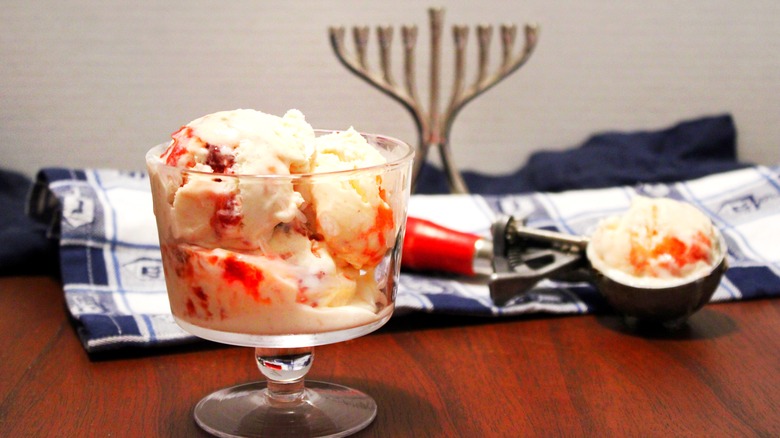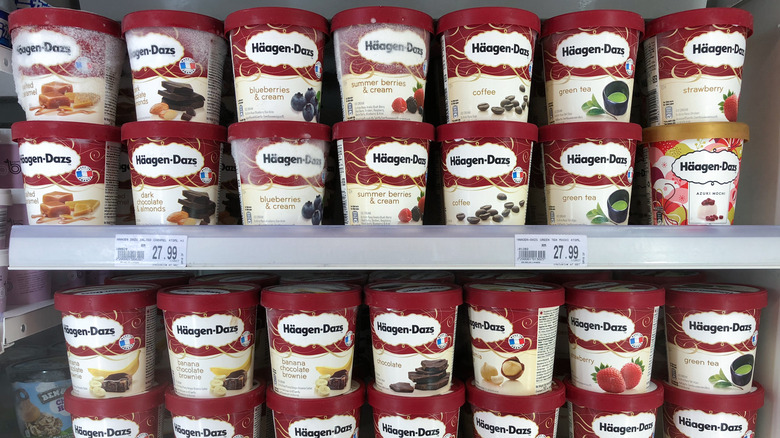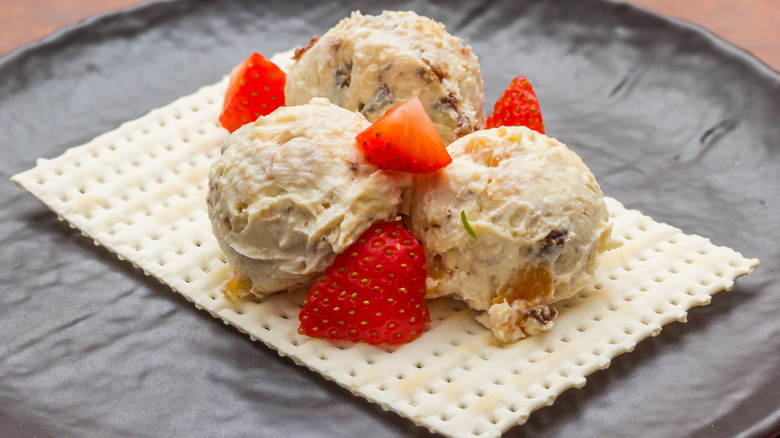Is Ice Cream Kosher?
The rules that define kosher dietary customs (called kashrut) are complex, and they differ among various Jewish denominations and ethnic groups. While not all Jews keep kosher, approximately 22% of American Jews and 63% in Israel adhere to one or more aspects in their homes (per Pew Research). Albeit an oversimplification, kosher traditions can be broken down into four main tenets: Not eating forbidden foods such as pork or shellfish; not mixing meat with dairy in the same meal; observing a waiting period between eating meat and dairy; and only consuming foods that have been kosher certified.
Although it may seem restrictive, there's plenty of leeway for those following a kosher diet to enjoy a wide range of nutritious and delicious foods. This leads to an all-important question ... Can observant Jews eat ice cream? Yes, indeed, one can absolutely have ice cream while keeping kosher. Ice cream is not considered "treif," a Yiddish word designating non-kosher, prohibited foods. A deeper dive into whether the frozen treat is kosher or not, however, is more complicated.
Take for example rocky road ice cream, which is made from a blend of chocolate ice cream, nuts, and marshmallows. When you look at what marshmallows are actually made of, one of the ingredients is gelatin, which is made from pigs and cows. So even though this ice cream flavor may have otherwise kashrut ingredients, the fact that it also contains a somewhat hidden pork product makes it not kosher.
Why ice cream needs kosher certification
You may have noticed kosher certification symbols on tubs of ice cream. One of the most common is a letter U inside of an O, which means certification by the Orthodox Union. The letters K-S-A is another example; they stand for the Kosher Supervision of America. You might also see the letter K within a star, or the Hebrew letter "kof" (for K). These all indicate that the product was manufactured under supervision of a rabbi and meets kosher standards.
In the case of ice cream, this means that there was no manufacturing cross-contamination, i.e. no mixing of meat and dairy ingredients, and no ingredients derived from unclean sources. The concept of unclean food in Judaism comes from the Bible, where in Leviticus 11:46-47, God tells Moses and Aaron that "You must distinguish between the unclean and the clean, between living creatures that may be eaten and those that may not be eaten."
Aside from an obvious non-kosher combo like maple bacon ice cream, there are more subtle reasons that can render the dessert unclean. Sometimes cream is made with whey from cheese that contains rennet — an enzyme from the stomach lining of animals. Some stabilizers contain gelatin, and some emulsifiers are made from animal fat tallow. Supervision and certification guarantee that kosher ice cream does not contain these treif ingredients, and that only dedicated kosher equipment is used. The majority of big brand ice creams offer kosher certified flavors, including Häagen-Dazs, Baskin-Robbins, Ben & Jerry's, Carvel, Dryer's, and Talenti.
How ingredients and timing affect if ice cream is kosher
"Parve" signifies a neutral food that contains neither meat nor dairy, and can therefore be eaten together. These foods include bread, eggs, fish, fruits, vegetables, nuts, and plant-based substitutes like faux meats, soy cheese, and almond milk. Non-dairy and fruit sorbet options also make it so those that are kosher can have their ice cream and eat it, too.
A further distinction as to if ice cream is kosher depends on when it's eaten. The halachic waiting period governs how much time must pass between eating meat and dairy. Timing differs among Jewish groups, but a general timeframe is that an hour must pass after eating dairy before eating meat, and six hours must pass after eating meat before eating dairy.
It's also important to note that everyday kosher is different from kosher for Passover. During the weeklong holiday, Jews abstain from chametz foods, which refers to leavened grains. So, while ice cream flavored with cookie dough or brownie pieces may be kosher most of the year, those add-ins render it forbidden during Passover. The certification symbol of a capital letter P on the label of your favorite ice cream tells you if it's kosher for Passover.



